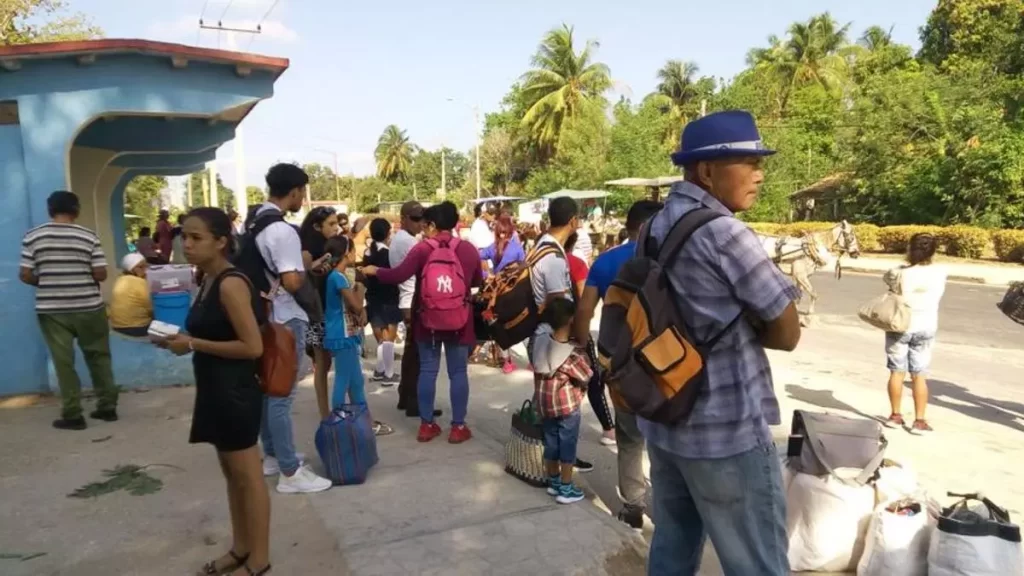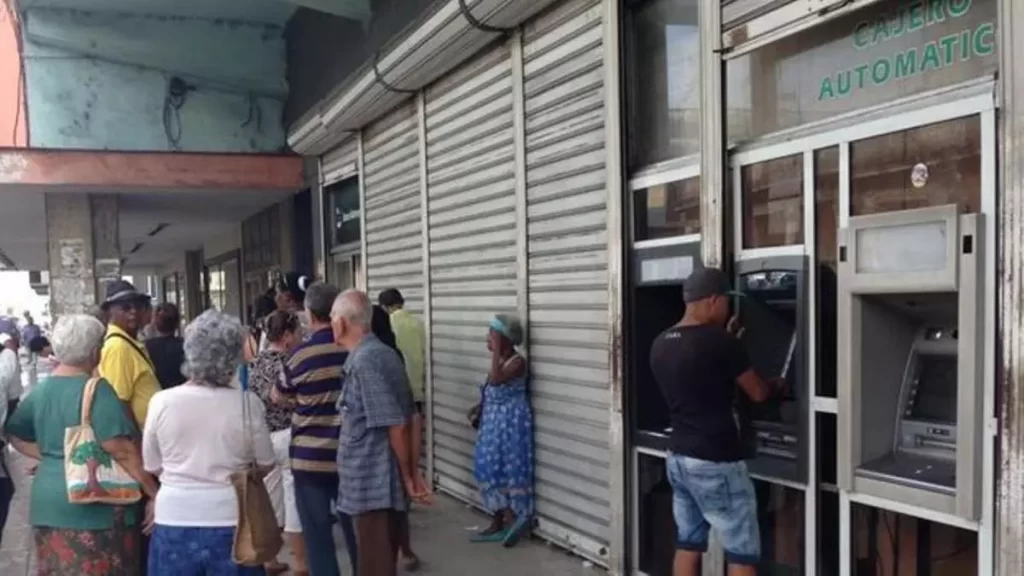The minister did not detail what has happened to the 3.2 million passengers who traveled before, nor whether he is referring to public transportation or the entire vehicle fleet of the Island, including private and company cars, but he recounted, before the undaunted face of the president, the troubles of his portfolio. For example, the fact that officials do not stop their cars to pick up passengers at designated stops (as they are required to do); the sanctions that he has had to apply to ensure that this “recommendation” is met; transportation’s effects on the distribution of the basic family basket through the rationing system, which the other ministries attribute to their own management, and, above all, the low availability of foreign currency, which reduces the management of the portfolio in all its areas.
In summary, Rodríguez Dávila concluded, Cuba faces, in terms of transportation, “one of the worst moments in recent years.” Point by point, the headline presented to Díaz-Canel the “distortions” of the sector. To begin with, he insists, the transportation sector “is one of those that generates the most income,” but the difficulties in accessing foreign currency hamper, for example, the acquisition of spare parts, vehicles and other necessary inputs, which are mainly imported. continue reading
If the data on these incomes are not made public it is because the country is “under observation”
If the data about these incomes are not made public, Rodríguez Dávila explained with suspicion, it is because the country is “under observation.” “Every time we have a positive result, they generally try to harm it but we really have good results,” he said, without explaining the source of this harassment of the “good results” of the Government.
As a consequence of the absence of foreign currency, the minister explained, companies begin to use parts from non-working vehicles to repair others. In the long run, this “cannibalism” – the president reminded him of the term – implies that there will be vehicles that will never be put into circulation again.
The situation worsens if one takes into account that cars from state companies rarely stop at stops to help transport passengers (as they are required to do) and that private cars increasingly boast more abusive prices. Regarding the first point, both leaders recognized that it is the companies’ task to draw the attention of their drivers and managers, but in the second case the solution is not so simple, they acknowledged.
Since the increase in prices in March, the Government decided to continue selling fuel to private transporters at wholesale prices to avoid the increase in transportation prices. However, contrary to what happens in state companies – which acquire products first-hand and at the exchange of one dollar for 24 pesos – private drivers must cover vehicle maintenance on their own and at much higher prices. “Creating a kind of market to sell to private carriers at normal prices – not what they buy today, for example, tires and batteries – has also been an aspiration that we have not been able to face because all that costs foreign currency,” lamented the official. .
“We have decided that non-state forms of management pay the same price”
The same thing happens with fuel, the minister acknowledged. “We have decided that non-state forms of management pay the same price. The problem is that we do not always give them access to fuel, because there is no availability and certain services must be prioritized,” he admitted. “In many places in the country they do not have direct access to fuel. Then they acquire it in an irregular way, through resellers and in many cases for 10 times the value of what it normally costs in service centers.” This, he adds, is an effect of inflation that influences the cost of private transportation and, therefore, the pockets of passengers.
“What needs to be provided is buses,” says the minister, which is what the population demands. If he does not do it, it is due to lack of foreign currency, because all these desires are “very expensive” and even more so – he stressed – with the “financial persecution” of the United States, which is hot on the heels of his purchases.
A bus, he gave as an example, would cost him about 100,000 dollars – double that, if it is articulated; a locomotive, between two and a half million dollars and three million; a small plane, about 30 million and a ferry, more than 10 million dollars. Conclusion: without “international cooperation” there will be no buses or trains, because everything is “very expensive.” Cubans have also not taken good advantage of the opportunities, he alleged cryptically, because they “lack experience” and desire for innovation.
In a week without the US embargo – taking into account that according to the regime the ’blockade’ (as the government prefers to call the embargo) costs Cuba 13 million dollars a day – “206 buses, six trains, a plane and a ferry could be acquired,” he counted.
As an alternative, the minister aspires to a “resilient and low-carbon development” of Cuban transportation, for which his portfolio partnered with the Iris foundation, a state climate initiative. His goal: transportation with renewable energy, but spending as little money as possible, he clarified. Some of these initiatives, he assures, are already being carried out in several provinces of the Island.
The next step, he argued, is to ensure that these investments, mostly from foreign organizations, can pay for themselves, so they are fundamentally dedicated to projects that later generate foreign currency. This is the case of a floating dock, which is already in operation, said Díaz-Canel. Progress is also being made in improving shipyards and airport facilities. For the minister, the key is to obtain low-interest loans or long-term payment agreements, which do not involve large commitments for his portfolio.
For example – with the new ’Viajando application’ the available capacities of the day are 7,000 trips, against a demand for 40,000
Another alternative, Rodríguez Dávila noted, was the implementation of the Viajando application* which, despite being promising, fails to meet the demand. “The available the available capacities of the day are 7,000 trips, against a demand for 40,000. So that is really a very strong tension for the application,” he said.
In his most outspoken moment, Díaz-Canel scolded Rodríguez Dávila for the poor management of the Havana Bay tunnel, which reopened this Sunday without the planned repairs having been completed. “You had to know that before you started. And that was what the population was communicating. That is why I insist so much on inspection systems and the systematic nature of work,” said the president.
For his part, the head of Transportation admitted that the population had warned about the tunnel lighting problems, the dirt on the walls and the poor condition of the road. From there, he adds, “we incorporated more than 30 new tasks into the tunnel schedule that were not originally planned and, in addition, we acknowledged to the people that this did not sit well us,” he argued.
After an hour of acknowledging the poor state of the portfolio and blaming the United States for the island’s economic ills, Díaz-Canel closed the program with his usual ideological note, celebrating the worn-out “creative resistance of the Cuban people,” which probably will not see an immediate improvement to the transportation situation.
*Translator’s note: APK Viajando is a Cuban application for mobile devices, designed so that registered users can purchase tickets to travel on interprovincial buses, trains or catamarans, depending on the desired destination, within the national territory.
____________
COLLABORATE WITH OUR WORK: The 14ymedio team is committed to practicing serious journalism that reflects Cuba’s reality in all its depth. Thank you for joining us on this long journey. We invite you to continue supporting us by becoming a member of 14ymedio now. Together we can continue transforming journalism in Cuba.

![]() 14ymedio, Havana, 18 April 2024 — After announcing its remodeling in 2019, and after several years of work, the Metrópolis hotel finally found an owner. Located on Aguacate Street, on the corner of O’Reilly, in Old Havana, the complex will be managed by the German chain Kempinski Hotels, and plans to open within five months.
14ymedio, Havana, 18 April 2024 — After announcing its remodeling in 2019, and after several years of work, the Metrópolis hotel finally found an owner. Located on Aguacate Street, on the corner of O’Reilly, in Old Havana, the complex will be managed by the German chain Kempinski Hotels, and plans to open within five months.

















